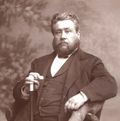Therefore, when they were come hither, without any delay on the morrow I sat on the judgment seat, and commanded the man to be brought forth.(Acts 25:17)
Against whom when the accusers stood up, they brought none accusation of such things as I supposed:(Acts 25:18)
But had certain questions against him of their own superstition, and of one Jesus, which was dead, whom Paul affirmed to be alive.(Acts 25:19)
And because I doubted of such manner of questions, I asked him whether he would go to Jerusalem, and there be judged of these matters.
But when Paul had appealed to be reserved unto the hearing of Augustus, I commanded him to be kept till I might send him to Caesar.(Acts 25:21)
Then Agrippa said unto Festus, I would also hear the man myself. To morrow, said he, thou shalt hear him.(Acts 25:22)
And on the morrow, when Agrippa was come, and Bernice, with great pomp, and was entered into the place of hearing, with the chief captains, and principal men of the city, at Festus' commandment Paul was brought forth.(Acts 25:23)
Other publications related to "Acts 25:20":
Acts 25:20 - Cross Reference
But Festus, willing to do the Jews a pleasure, answered Paul, and said, Wilt thou go up to Jerusalem, and there be judged of these things before me? (Acts 25:9)

